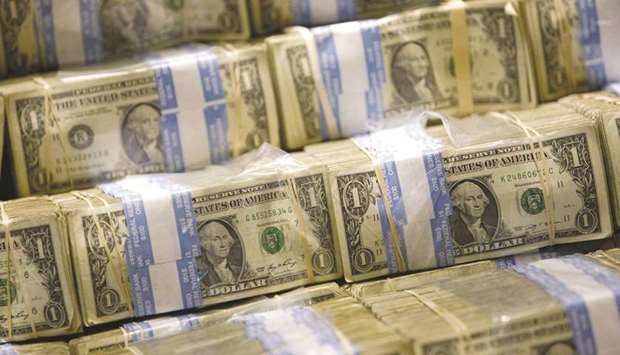The dollar’s three-week slide is providing a boost for assets including emerging-market currencies and commodities as the prospect of a pause in Federal Reserve policy normalisation emboldens Wall Street to recommend bearish greenback wagers.
After the longest slump in the US currency in almost a year, strategists from Goldman Sachs Group Inc, Nomura Holdings and Morgan Stanley are advising clients to bet on dollar declines versus a number of peers.
Brown Brothers Harriman & Co analysts say growing angst about a US recession means dollar losses will continue even if some data – such as Friday’s jobs report – indicate economic strength.
The Bloomberg Dollar Spot Index is near the lowest since October and is down more than 2% from its 2018 peak set last month, after Fed Chairman Jerome Powell said Friday that policy is flexible and officials are “listening carefully” to financial markets.
Futures still indicate the next move by the central bank will be a cut, despite officials signalling two hikes in 2019.
Less restrictive policy may boost the outlook for global liquidity and riskier assets.
“US dollar-supportive growth divergence may turn into US dollar-weakening growth synchronisation,” Morgan Stanley strategist Hans Redeker wrote in a note Monday, in which the firm re-affirmed its outlook for dollar weakness versus the yen, the Canadian and Australian dollars, and South African rand.
Of course, there are other forces influencing emerging markets.
Part of the reason these currencies are rallying now is China’s move to release more cash into the financial system.
But investors’ view on the Fed plays a crucial role.
Bilal Hafeez, Nomura’s global head of G-10 foreign-exchange strategy, said in a note Monday that while the market has priced out Fed tightening – so there’s a risk of a dollar rebound if those projections reverse – the greenback’s path is still ultimately down.
He laid out that view in a 2019 outlook note published last month.
That’s in part because while lower US rates will likely aid equities, it could prove a dollar-negative, mirroring the environment of the 2000’s.
He advised shorting the dollar versus the yen and euro, targeting 102 yen per dollar and $1.20 per euro, from 108.68 yen and $1.1443 per euro yesterday.
Goldman’s economists see a likely Fed pause this quarter given tightening financial conditions and with key inflation readings holding below 2%.
Goldman’s co-head of global currency and emerging-market strategy, Zach Pandl, recommends shorting the ICE US Dollar Index, predicting about a 3% decline.

The dollar’s three-week slide is providing a boost for assets including emerging-market currencies and commodities as the prospect of a pause in Federal Reserve policy normalisation emboldens Wall Street to recommend bearish greenback wagers.
